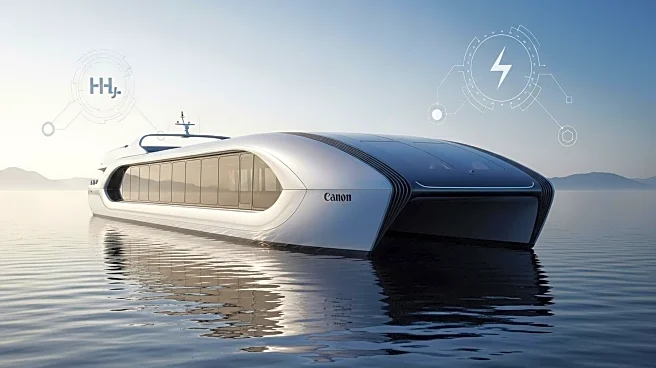What's Happening?
Chinese auto manufacturer Geely has launched its first inland cargo barge that combines methanol and hydrogen electric technology, marking a significant expansion of its methanol technology into the maritime sector. The vessel, named Yuanchum 001, was launched at the Hangzhou Qianhang Shipyard and is designed to operate in four different modes, offering a combined range of nearly 1,000 miles. This innovative approach allows the vessel to consume 42 percent less energy compared to similar diesel vessels. Geely has been developing methanol technology for 20 years and is now expanding its applications to include green methanol production, carbon capture, and various vehicle applications.
Why It's Important?
The launch of Yuanchum 001 represents a major step forward in sustainable maritime operations, potentially reducing the environmental impact of shipping. By integrating methanol and hydrogen electric technology, Geely is addressing the global demand for cleaner energy solutions in transportation. This development could influence other sectors to adopt similar technologies, promoting a shift towards more sustainable practices. Geely's expansion into the maritime sector also highlights the growing importance of alternative fuels in reducing carbon emissions and enhancing energy efficiency.
What's Next?
Geely plans to continue expanding the applications of its methanol-hydrogen technology, including further investments in maritime logistics. The company is also targeting increased international sales, with plans to introduce new vehicle models in markets such as Australia, Brazil, and Poland. As Geely strengthens its global supply chain, it may influence other manufacturers to explore similar technologies, potentially leading to broader adoption of methanol-hydrogen solutions in various industries.
Beyond the Headlines
The integration of methanol and hydrogen electric technology in maritime operations could have long-term implications for global shipping standards. As environmental regulations become more stringent, Geely's approach may set a precedent for other companies to follow, potentially leading to widespread adoption of cleaner technologies. This shift could also impact global trade dynamics, as countries and companies prioritize sustainable practices in their operations.









